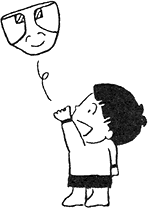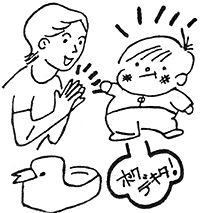
Canal Hamamatsu | Top Page > Child Care > Discipline for Children
ここから本文です。
更新日:2022年7月19日
Discipline for Children
Toilet Training
The best opportunity is between 18 and 24 months.
How to start and progress
Learn your child’s toilet habits!
- About how long is it between each time they go to the toilet?
- What are the signs that show you that they need the toilet?
Let them wear underpants instead of a diaper!
- They’ll feel unpleasant when they wet themselves
Do it in a fun environment and have fun as you progress!
- Carry on the toilet training every day in the same place with the same people.
Waiting over three minutes is a waste of time. Next time!
- Don’t make them force it.
If they go to the toilet, praise them lots!
Help them with the timing!

Times when it’s easier to go to the toilet
- First thing in the morning
- Just before or after a meal
- After their midday nap
- Before they go to bed at night
Points
- Don’t rush or scold them
- It’s easier in warm seasons (spring to autumn)
- It takes about half a year
- It varies from person to person

Thumb-Sucking
When do children suck their thumbs?
- When they want to be coddled but don’t get attention (if they’re not getting enough physical contact)
- When they’re told they can’t do something
- When there’s a younger child in the family getting more attention
- When they have no-one to play with and they’re sitting around absent-mindedly
- When they’re watching TV
- When they’re sleepy
Does your child act absent-minded on such occasions?
If your child is always sucking their thumb, try to turn their attention to something else.

Some things to try!
- Teach them things that they’ll find fun or interesting!
Play together as parent and child. Play games that use their fingers. Sing together. - Don’t leave the TV on. Put it on for a set amount of time. Watch it together.
- Tell them verbally.
…It doesn’t look nice.
…Your teeth will turn out badly. You will have a scary face. Etc. - Play lots outside.
- Let them play with their friends.
- Answer your child’s questions properly.
- Stay with them until they fall asleep. Read a book. Talk to them to calm them down.
※There are lots of different methods!
Start from what you can do.
Things to avoid
- Scolding them
- Scaring them
- Teasing them
- Punishing them
- Forcing them to stop
Even if you force them to stop sucking their thumb, this isn’t a real solution.
It may even have the opposite effect and cause it to get worse. It may change to another habit.
Instead, create an environment where they can be relaxed in their everyday life.
Similar habits
- Biting their nails
- Sucking or licking their lips
- Sucking or never letting go of a towel, handkerchief, sheet or blanket
Try to break these habits using the same methods as those for thumb-sucking.
To Help Develop Language
Help them remember words
Use the right words for the right occasion
When you’re eating food that tastes good, show this on your face, and say “Yum!” with feeling. Let them hear the same words over and over by talking about what is going on around you.
Don’t say “this” and “that.” Use the names for things and put them in a sentence.
Instead of “This over here” or “Don’t do that,” make proper sentences like, “Put the picture book on top of the table.”
Speak to them with correct pronunciation
Children may pronounce words like “juichu” and “bachu.” The adult should repeat the words using the correct pronunciation: “The juice is good, right?” “Yes, you can see the bus!” Don’t keep making the child repeat the correct pronunciation.
Let them see and experience lots of things
By doing lots of things, they will have more experiences to draw from for words and can imagine different situations.
Playing games helps develop language
For children, playing is what they spend most of the day doing.
Have places in the house that they can play freely in.
Talk to them and look at picture books together
At your child’s pace, read the story aloud and look at the picture together.
Sing songs to them
Children remember the words to the songs that their parents sing to them. They also remember how words are formed.
Practice clear pronunciation.
Understand what your child wants to say and supplement it
Match your way of speaking to your child. Then, add a little bit to what they want to say. This way, they will naturally learn new words and be able to use them of their own accord.
Things for Mothers to be Careful of
Children are all different
Just like children are all different with regards to physical ability, children are different in how they pick up language.
Don’t force them. Create an environment that is easy for them to learn in.
Don’t force them to name things
Don’t test them and force them to answer by saying, “What’s this called? It’s a cat. You know it’s a cat. Say cat!” This won’t help their language development.
Instead, as they go about their daily life, when your child shows interest in, for example, a cat, tell them, “Oh, there’s a cat over there!”
Don’t deny your children’s words
Child: A fush! (fish)
Parent: It’s not a “fush,” it’s a “fish.”
…This is unfair on the child.
They’ll just be sad if the word they said gets denied by someone they love.
Parent: That’s right, a fish!
…Repeat the word correctly for them.
Speak on the same level as your child
If the parent speaks to themselves and tries to get the child to copy, talking isn’t fun for the child. They’ll find speaking annoying.
Match your pace with your child, and show them how fun conversation is.
Being Understanding
When children point
When children use their finger to point, they are talking without words.
Children point to show their surprise and enjoyment, telling you, “Look, look, there’s something here!”
This is another example of the connection between parent and child.
Even if you’re busy, try to see it from the child’s point of view and answer them.
Answer them, for example saying, “Yes, there’s a doggy over there!” or singing a song that fits the situation, and let them have fun. They will become interested in more things. It provides stimulation for them to learn new words.
より良いウェブサイトにするためにみなさまのご意見をお聞かせください